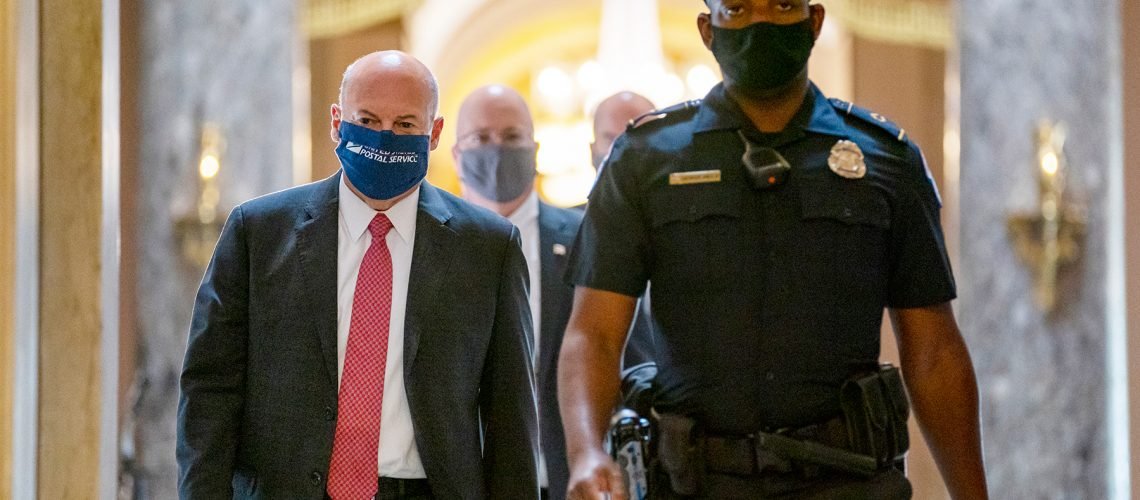WASHINGTON — Louis DeJoy, the logistics expert and Republican mega-donor who now serves as the Postmaster General, made his debut appearance before Congress on Friday. Senate Democrats grilled DeJoy on the recent delays in mail delivery and DeJoy’s plans to overhaul the Postal Service’s operations. While most Senate Republicans came to DeJoy’s defense, a few also questioned him, albeit more gently, on why their constituents had seen longer wait times to receive critical mail parcels such as vital medications and Social Security checks.
The big question that hung over DeJoy’s testimony, though, was this: Would DeJoy’s plans to remedy the Postal Service’s financial issues imperil the 2020 election, which could see the largest use of mail-in voting in American history?
In his testimony, DeJoy pledged that the Postal Service would ensure all mail-in ballots were delivered on time. But when it came down to specifics, he was at times vague and evasive. And he was firm that he would not reverse certain changes already in effect such as the decommissioning of mail-processing equipment. “There is no intention to do that,” DeJoy said when asked about restoring mail-sorting equipment that had been taken offline. “They are not needed, sir.”
Since taking over as Postmaster General two months ago, DeJoy has faced intense criticism for overseeing changes that could imperil the integrity of this year’s election. In an effort to cut costs, he proposed eliminating overtime pay for postal workers, reducing the number of USPS drop boxes, scaling back hours at USPS retail locations, taking mail-processing equipment out of commission, and adjusting the working hours for postal workers — all changes that could lead to longer delivery times, according to postal workers and the union that represents them.
Due to legislation passed in 2006, the decline in first-class parcels, and increased competition from FedEx and UPS, the U.S. Postal Service face serious financial problems. A 2019 analysis by the Government Accountability Office found that the agency had lost $69 billion over the past 11 fiscal years. The Postal Service’s total unfunded liabilities and debt were $143 billion at the end of the 2018 fiscal year, which was double the agency’s annual revenue.
Yet at the same time, DeJoy’s move to immediately try to slash costs raised the question of whether USPS — an agency 91 percent of Americans say they view favorably — would be ready to handle a surge in mail-in ballots in this year’s election. Former President Barack Obama highlighted the potential changes at USPS and the reported delays in service at the late Rep. John Lewis’ funeral last month. “There are those in power doing their darnedest to discourage people from voting — by closing polling locations, and targeting minorities and students with restrictive ID laws, and attacking our voting rights with surgical precision, even undermining the postal service in the run-up to an election that is going to be dependent on mailed-in ballots so people don’t get sick,” Obama said.
After the outcry, DeJoy announced last week that he would hold off on any major changes to the Postal Service’s operations until after the 2020 election. In his testimony on Friday, he repeatedly said he supported Americans’ ability to vote by mail and said he and the USPS staff “feel bad about the dip in our service the level. We serve 161 million people. We still deliver at 99.5% of the time…Everybody’s working here feverishly to get that right.”
DeJoy tried to reassure Americans that they should “feel comfortable that the Postal Service will deliver on this election.” He told Sen. Mitt Romney (R-Utah) that he was “very, very confident” that any ballot mailed in as late as week before Election Day would be delivered in time to be counted.
But when Sen. Maggie Hassan (D-N.H.) pressed DeJoy for a specific plan about how the Postal Service would fulfill its role this election season, DeJoy declined to give specifics. “There are detailed processes we’re going through,” he told Hassan, but when the senator asked for those details or that plan by Sunday night, DeJoy demurred, saying he would try to provide it to her within a week’s time.
DeJoy also professed to have “no idea” about a recent internal directive sent by a USPS maintenance director to not reconnect mail-processing machines that had been recently taken out of service as reported by CNN. DeJoy told Sen. Hassan that “this whole process was new to me last week.” DeJoy did, however, make a “promise” to Sen. Kyrsten Sinema (D-Ariz.) that he would not make any further changes to USPS’s operations before Election Day.
In recent weeks, the debate over the role and future of the Postal Service has settled into familiar partisan tracks. While Democrats have assailed DeJoy for trying to overhaul the agency so close to an election, Republicans have described the criticism of DeJoy as a “conspiracy theory” and a “political hit piece.”
At the end of Friday’s hearing, Sen. Ron Johnson (R-Wisc.) appeared to float a theory of his own, claiming that the calls and emails he’d received from constituents about USPS “seem very highly scripted and possibly part of “a very well organized effort.” He went on to say that “Democrats are ginning these problems up” involving USPS into a “false narrative designed to extract a political advantage.”
There’s not a shred of evidence for any of that, so Johnson is just making a wild accusation about Democrats to obscure the Trump administration’s incompetence and malfeasance. But that’s sort of his thing now, anyway.




